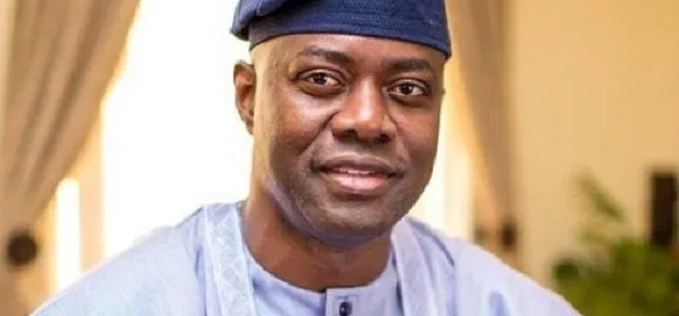E-Business
eGovernance Helping us Transform Oyo — Makinde

Governor ‘Seyi Makinde of Oyo State has revealed that the introduction of e-governance to the running of government in the state has contributed immensely to the on-going massive development and transformation in the state.

Governor ‘Seyi Makinde of Oyo State
The governor stated this while addressing the Institute of Chartered Accountants of Nigeria (ICAN) 50th Annual Accountants Conference in Abuja, with the theme: “Achieving Sustainable Leadership Through E-government in the 4th Industrial Revolution.”
Maakinde stated that the openness and transparency engendered by the introduction of e-governance initiative has helped the government to fund infrastructure and ensure smooth and full payments of salaries and pensions as and when due, stating that his government has been able to block leakages and save massive resources.
A statement by Taiwo Adisa, chief press secretary to the governor, indicated that Makinde equally said that for the country to experience sustainable development and not to be left behind in the fourth industrial revolution, it needs focused leadership, which will be able to harness its potential to “pick up and catch up with the rest of the world”.
The governor stated that upon the realisation that the state has limited resources for all the things that needed to be done and that there were many loopholes through which resources were siphoned, it quickly took action to block those leakages by creating an E-governance Plan.
He noted that the plan entailed digitising all government processes and services in order to raise the coverage and quality of information and services that are provided to the general public, stating, however, that a lot of people misunderstood that period of laying a solid foundation for development and tagged him an audio governor.
According to the governor, the introduction of the e-governance initiatives across different sectors including budgeting, contracting, public procurement, job recruitment, land and housing, among others, has now paid off for the state, as, according to him, apart from saving huge resources which are now being channeled to development, it has also made governance more efficient.
He said: “You may wonder, what has been the result of our installing e-governance processes? In what way has e-governance benefited the people of Oyo State? Massive savings. Let me share one example. When we came in, we got consultants to look into the processes in our tertiary institutions and make things more transparent. We created a database of all staff and did identity management for them.
“We also put the prices of all items that a university needs for day to day running in a database. And so, when a requisition is made, the price has to tally with that in the database. In just one school, The Polytechnic Ibadan, we got a savings of N1 billion by following this process.
“When people ask, where is the Oyo State government getting money to pay salaries when other states are struggling to pay percentages? Is he borrowing money to fund recurrent expenditure? The answer lies in openness and transparency with which we have approached leadership and governance. Especially with the use of technology.
“I have heard people say that Oyo State has been turned into a massive construction site. We are building a state that everyone should be proud of. And technology is playing a huge role in our work. “We know that the foundation is very important. When the pioneers of the first industrial revolution started work in the 1750s, they could not have imagined how their work would be built on. 270 years down the line we are talking about a fourth revolution. This is what focused governance entails. Looking beyond one’s tenure in government.
“What I have learnt so far in Oyo State is that e-governance is possible. The transparency and openness it offers is desirable. But there are challenges. Aside from the initial cost of building the infrastructure which might appear restrictive if a leader is not looking at the bigger picture, there is also the loss of political capital that comes with it. And I must say, the latter is a bigger reason why governance in Nigeria has remained in an analogue state.
“Recently, Oyo State has been in the news. The perception that has been created in some circles is that the state is insecure. Some people have even gone to town with claims of cannibalism. But when you dig deeper, you will find that sponsors of these messages are people who no longer have access to the state’s coffers. They are people who believe that it will be business as usual. These days you see them gathering to talk about how their political age confers on them some superior level of thinking or how they will be taking over in 2023.”
The governor admonished that for individuals thinking of making changes in governance in the country, they must be ready to embrace transparency and openness, saying: “So, for any of you here thinking of making changes in governance in the next few years, you must think in terms of bringing the transparency and accountability that digitisation and setting up processes have given to the private sector into the public sector.
“This is how Nigeria can really benefit and become a leading voice in this fourth industrial revolution.”
E-Business
Galaxy Backbone Celebrates the Federal Government’s Paperless Civil Service Milestone

Galaxy Backbone (GBB) aligns with and celebrates the successful announcement by the Office of the Head of the Civil Service of the Federation on the achievement of a Paperless Civil Service, a significant milestone in Nigeria’s public sector reform and digital transformation agenda.

The milestone was formally highlighted at a press briefing led by the Head of the Civil Service of the Federation, Mrs. Didi Esther Walson-Jack, who commended Galaxy Backbone for its sustained support and contribution throughout the implementation of the programme.
GBB has played a critical role in enabling this transition by providing secure, scalable, and shared digital infrastructure that supports the digitisation of government processes across Ministries, Departments and Agencies (MDAs). Through the 1Government Cloud, MDAs have been empowered to migrate from paper-based workflows to digital platforms, improving efficiency, collaboration, data security, and service delivery across the Federal Civil Service.
In addition, GovMail, GBB’s secure government email platform, has strengthened official communication, enhanced records management, and reinforced cybersecurity standards—key pillars in sustaining a paperless operating environment.
Galaxy Backbone acknowledges the collective efforts of the Office of the Head of the Civil Service of the Federation, Permanent Secretaries, Directors of ICT, consultants, partners, and dedicated public servants whose commitment and collaboration ensured the smooth delivery of this initiative.
The Managing Director/Chief Executive Officer of Galaxy Backbone, Prof. Ibrahim Adeyanju, was represented at the press briefing by Akintayo Bamisaye, Acting Group Head, Research, Digital Innovation and Skills Department (RDIS).
GBB describes the achievement as a strong close to 2025 and reaffirms its commitment to supporting the Federal Government in building a modern, efficient, and digitally enabled public service.
E-Business
Jumia CEO says Black Friday Signals Nigeria’s E-Commerce Maturity

At the close of 2025, Temidayo Ojo, the CEO of Jumia Nigeria, reflected on a year-end shopping season that points to the growing maturity of the country’s e-commerce market. “Black Friday is no longer a single, short-lived spike in activity,” he said.

“It has become a familiar, anticipated moment in the retail calendar, where consumers shop deliberately and with confidence.”
Preliminary KPIs for the two months ended November 30, 2025, show strong year-on-year growth in both orders and Gross Merchandise Value (GMV), with GMV growth outpacing order growth. This indicates that customers are placing fuller, more considered baskets rather than shopping in fragmented transactions. Nigeria ranked among Jumia Group’s better-performing markets, with engagement remaining steady throughout the Black Friday period rather than spiking briefly and tapering off.
A key factor behind this performance is the growing familiarity of consumers with online shopping. Customers are increasingly leveraging platform features such as saved carts, brand stores, and price comparison tools to plan purchases in advance. This trend suggests that digital commerce is becoming embedded in everyday habits rather than being viewed as a one-off event.
Ojo also highlighted the role of Jumia’s JForce network in connecting digital commerce to local communities. “Our agents are critical to ensuring that customers across Nigeria, including secondary cities and smaller communities, have access to variety, consistent pricing, and reliable delivery,” he said. “During peak periods like Black Friday, JForce agents can respond faster, serve more customers efficiently, and build stronger local relationships. This isn’t just a distribution channel—it’s a pathway to sustainable income and inclusion.”
Reflecting on the overall performance, the CEO concluded: “What we’re seeing this year-end is steady engagement across categories, stronger consumer confidence, and partners like our JForce agents benefiting from increased activity.
“It confirms that Nigeria’s e-commerce ecosystem is maturing, growing in a more structured and resilient way. As the December Holiday Sale continues, we expect these patterns of familiarity, trust, and participation to sustain momentum and drive both commerce and community impact across the country.”
E-Business
Galaxy Backbone Tops FG’s Website Performance Ranking

Galaxy Backbone Limited (GBB) has been ranked first overall in the 2025 Federal Government Website Performance Scorecard.

This is a landmark achievement for Nigeria’s digital economy.
The ranking, conducted by the Bureau of Public Service Reforms (BPSR), is the definitive benchmark for digital excellence and transparency across all Ministries, Departments, and Agencies (MDAs).
Professor Ibrahim Adepoju Adeyanju, managing director and CEO of Galaxy Backbone, received the award during a ceremony in Abuja.
He described the feat as a validation of the agency’s“Nigeria First”data sovereignty strategy and its relentless pursuit of service excellence.
This recognition comes as the Federal Government intensifies its push to achieve a fully paperless civil service by December 31, 2025.
GBB has been the primary architect of this transition through its 1Gov Enterprise Content Management (ECM) platform, which now hosts the operations of almost all federal MDAs.
The award adds to a growing list of accolades for Galaxy Backbone in 2025, following its recent win of the “International Standard Excellence Award for Best IT Service Provider.”
As the central hub for government shared services, GBB’s performance serves as a blueprint for other agencies currently undergoing digital transformation.
With its expanded fiber-optic backbone now covering over 13 states and its secure cloud solutions, Galaxy Backbone remains the cornerstone of Nigeria’s vision to become a leading digital nation by the end of the decade.

 General News2 days ago
General News2 days agoNigeria Police suspends tinted glass permit enforcement over court injunction

 E-Financial1 day ago
E-Financial1 day agoFidelity Bank Appoints Onwughalu as New Chairman After Chike-Obi’s Tenure

 Broadcasting1 day ago
Broadcasting1 day agoDStv Offers Instant Package Upgrade for Customers from January to February

 Broadcasting1 day ago
Broadcasting1 day agoFIRS Transforms into NRS as Nigeria Ushers in New Tax Era

 News1 day ago
News1 day agoHURIWA Demands Accountability from SEDC Over N140Bn Budget Utilisation

 General News1 day ago
General News1 day agoMultiChoice Secures 12 Warner Bros. Discovery Channels in New Multi-Year Deal






















